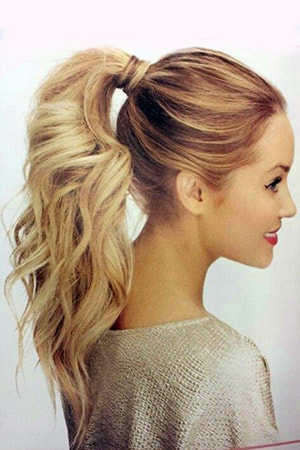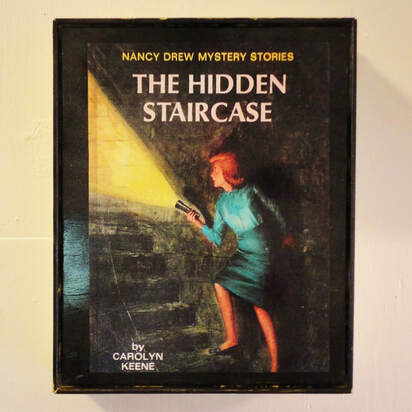all of the selves we Have ever been
 The recovery literature states that the first step is admitting you have a problem. In my defense, I did not bring this problem upon myself. Really… Age, hormones, and cancer did. The gene pool I swim in might have been a factor too. Nonetheless, I need to come clean: I have ponytail envy. No more denial or self-deception. Envy is one of the seven deadly sins. Most religions consider envy to be a disastrous emotion—like Cain killing his brother Abel. Just to be clear, you have no need to be afraid--mine is a benign envy. My pain is not directed at the good fortune of young women with full heads of hair who sport bouncing and swinging tresses. Mine is not a spiteful adolescent envy. I do not wish to inflict misfortune upon ponytail-wearing women or reduce their healthy, youthful status. My envy is more the type that longs to emulate, be one of the gals, preserve an element of youth and own this symbol of energy and potential. Whenever I see a long, full ponytail, I think of the old rock and roll classic Chantilly Lace that was first released in 1958. According to Wikipedia, Chantilly Lace was the third most played song that year. I was not yet listening to the radio in 1958, but the song is so catchy and popular that it continues to be played on rock and roll stations and has had several remakes. You might recall the words: Chantilly lace and a pretty face And a pony tail a-hangin down That wiggle in the walk And giggle in the talk Makes the world go ‘round The song is as lively as a long ponytail in the heat of a hundred yard dash. If you listen to the song, you will want a ponytail too. I frequently get the Chantilly Lace earworm during my walks along the shared-use bike path. It is a time when I am thankful for the mask mandate because I can’t resist singing a few bars. This public display of my lacking vocal talent is the direct result of a young woman who passes me on my left. I know I shouldn’t blame others for my actions during recovery, but this gal is a trigger. She jogs past me like I am standing still. The runner is young and fit. Attired in tight leggings and a sports bra, phone in hand, buds in ears, her long blonde ponytail swings left then right keeping pace with her feet. Despite her speed, she is not even breathing hard. I watch her move up the path, the ponytail is like a metronome that marks her time and regulates her pulse and breath. Her movements are smooth and graceful like a beautiful ballerina. I would need a magnifying glass to find a drop of sweat on her. Perhaps the ponytail acts as a fan as well as a metronome. I envy the youth and health and strength of ponytail-wearers. The movement and the energy reflect all of the potential within them. Somewhere along the way, from all of the dress-for-success feature articles I read, I think I gave up too soon on ponytails. Who was it that decided we get too old for ponytails? We need an investigation into this bad advice that leads to premature aging. Now that my hair is too fine and too sparse to sport a full, swinging ponytail, I have regrets, and so I move onto steps two and three of the recovery plan. I turn it over to a higher power and thank God I survived the cancer and all of the other challenges that made my hair so fine and thin. I continue to work on steps six and seven, acceptance and humility. Eventually, I will move further down recovery road and forgive those dress-for-success gurus for their bad advice and forgive myself for rushing the process of aging back when I was in a hurry to be all grown up.
0 Comments
 “We seldom leave places we understand.” I came across that quote during my morning time of prayer and reflection. It is from the early works of the psychologist Jordan Peterson before he fell off the deep end. Those words sink in; they explain a lot. No wonder I am a wanderer. I never know what the hell is going on. On the outside, I am a focused, tea-drinking, worker-bee. I miss the scoop to be had at the coffeemaker, the closed-door gossip sessions, and the after-work drinks at the bar. I have a quiet, orderly, and rich interior life; the outside world can be so loud, chaotic, and mean. With the added layer of social media, I sometimes feel that words have become a spray of bullets from an automatic weapon. I try not to travel extensively in that world. And so, it all remains a mystery to me. Perhaps that is why, as a school-age girl, I was so taken by Nancy Drew, and why I love her to this day. She loved a mystery, and there was nothing holding her back. In 2020, the year of the pandemic, Nancy Drew turned 90. Since the world was preoccupied with a mysterious new virus, Nancy’s birthday did not get the attention it deserved. If only someone had put Nancy Drew on the case…If only her father had won the White House, we’d know where and how this pandemic got started. For nine decades, Nancy Drew has remained a teenager. Detective work aside, one would think that many years of adolescence would exhaust anyone, even a super-sleuth. I suffered four quick years of high school. That was enough. Why anyone would do it for longer remains yet another mystery to me. I try to imagine Nancy Drew, the idol of my youth, growing older, getting old. Would she have survived to the age of 90? Survived the pandemic? Would she still be driving? If so, would she still favor a sporty blue convertible? Would she color her hair or proudly flaunt the gray? Would Bess and George still be her best friends? Would any of them be married? Divorced? Have endured breast cancer or other health crises? Would they have become parents or grandparents? Would they still be rocking sweater sets and pearls? And what of Nancy’s boyfriend, Ned Nickerson? Did he graduate from Emerson College, or did he get drafted and shipped off to Vietnam? If so, did he survive the war? Did Nancy and Ned’s relationship survive the Women’s Movement? Did they ever marry? Did Nancy’s mind remain active, clear, and clever? How did she cope with the changes of aging? Was she ever lonely or sick? Did she have regrets? What was it like for her when her father retired? After he died? Did Nancy remain faithful to the housekeeper, Hannah Gruen, as Hannah got older? What happened to River Heights, Nancy’s hometown? Would Nancy have solved mysteries at Wal-Mart? Shopped at Bed, Bath & Beyond? Would she have cursed the increasing traffic on those old, familiar streets? Did any creepy mansions remain with secrets left to expose? Did Nancy remain able to live on her own into her eighth and ninth decades of life? Or did she move into an assisted living facility or require a skilled nursing home? What mysteries might she have found in those places? Did she still find the answers to everything? It is difficult to imagine Nancy Drew grown old because I am young when I think of her. As a child, Nancy Drew allowed me to forget about my own life and enter hers. While I remember many of the book titles, I don’t remember too much about the actual mysteries. What stayed with me? Her spirit and her lifestyle. She was free to gravitate to what interested her. She was not weighed down by life and chores and homework. She was not limited by age. Adults sought her help and advice. Nancy’s lawyer- father trusted her, and Nancy was the one to look after his safety. Nancy had company in her adventures; she had resources and encouragement. Nancy Drew fed my hunger for an interesting, active life. I am not alone—Hilary Rodham Clinton and Ruth Bader Ginsburg are among the many gals who took Nancy Drew as a role model for smart women. But Nancy wasn’t just smart, she was self-assured, the quality most lacking in children, teens, and women of my generation. Nancy was free of all bondage and baggage. She didn’t just try to solve problems, she went looking for them. Try as I might to imagine it, my mind resists the image of an aging Nancy Drew. I prefer her gumshoes to my orthopedic shoes. It was never in the program for her to become more like me. The real mystery was how to become like her. She was an early female superhero. Her superpower was helping young women to believe in themselves. I really don’t want to see Nancy Drew in the nursing home—unless she is there to bust me out. We’ll go to a garden patio and eat dainty sandwiches and drink tea served from a silver tea set. We will discuss missing figureheads, missing grandsons, and missing violinists, spooky mansions, and our suspicions about the traveling circus. We will find the lost sheet music, the stolen statues, and the hidden wills. We will pour over the mysterious diaries and ominous notes. We will not be deterred by cryptic warnings of danger. We will live on—smart and self-assured with good friends, a swell car, the right clothes, and no homework. And always, always, always--we will fight for what is right. Nancy Drew can see what the world cannot. It is no mystery to her that there is still a teenage girl in me.
 A few years ago some friends of mine decided to give up shopping for traditional holiday gifts. Smart, hard-working, and successful, this couple had been fortunate in their lives and careers. Their home and those of their extended family members were bursting with “stuff.” My friends decided that instead of more stuff, they would give their children, grandchildren, and relatives the gift of “experiences” such as travel, wine tastings, and game nights. I applauded the idea--what a wonderful way to share time, build memories, and solidify relationships; and for children and young adults, a precious opportunity to see older adults and grandparents as smart, curious, vital, interesting, active, and FUN. That conversation brought to my mind the first time I visited the RainForest Exhibit at the Cleveland Metroparks Zoo. I went to see the exhibit soon after its opening in 1992. The experience was every bit as exciting for the adults as it was for the children oohing and ahhing at the giant waterfall and interactive exhibits. As we made our way around the exhibit area, the lights went down, thunder began to rumble, and lightning lit up the “sky.” We experienced a tropical rainstorm. It was a moment of enlightenment for me, not because of the lightning strike, but because I realized someone, some person, made this happen. It was someone’s actual job to make it rain in a building! I might as well have been struck by the lightning that day because I have never forgotten the feeling that new insight gave me. So much more is possible than I ever imagined. While women had been instrumental in the war effort, growing up in the post-WWII era, girls were still expected to stay within the boundaries of traditional roles. By the 1970s, the Women’s Movement was shaking things up, and more teenage girls were going off to college, but career advice remained traditional. A young lady could be a secretary, teacher, nurse, or if Catholic, a nun. That was the narrow range of typical options as I prepared for entry into the adult world. Fast forward (really fast or it will take up your entire day)--2020 put all of our lives on pause as we tried to survive and wait-out a pandemic. It has been a time of upheaval and re-evaluation. The usual and the traditional were torn apart. Some folks lost their health, others their lives. Some people found they could work from home, and they liked it. Others realized they had been in need of more family togetherness. Some said the togetherness was too much. Many women homeschooled their children and discovered they did not want to be teachers or fulltime homemakers. People were forced into a new experience and many came to new insights about themselves, their lives, and possibilities. With the coronavirus vaccine reaching more people, it is time to prepare for re-entry. What will life be like on this new earth? We’ve been away for a while. When astronauts prepare for re-entry from outer space, they don’t just fall back to earth. NASA has planned for a controlled descent, a careful trajectory to bring them home. Adjustments are made to the “attitude” or orientation of the spacecraft and a heat shield protects the returning vessel from bursting into flames. Parachutes and balloons deploy for a safe landing, and fresh air enters the craft as the astronauts bob about on the ocean awaiting their ride to dry land. It has been a time of re-evaluation for me. I grew older and crossed over the line into Medicare. It gave me an unanticipated sense of freedom that I no longer had to be tied to work in order to have health care. I began to think about the freedoms I had during the pandemic and the things I lost and missed. The pandemic turned out to be precious time to think about what it is that I care about and enjoy. What I can live with and what I can’t live without. I am seriously considering my new trajectory and my attitude, trying to adjust so that I don’t burst into flames. Bobbing around on the ocean might be fun. Maybe I will learn how to make it rain in a building or do something that has never been done before. In the pandemic shift, there was a gift of experiences and possibilities. Prepare for re-entry.  The truth is out. Upon hearing it, I nearly fell over right there on the spot. The revelation came from a colleague of mine who owns a poultry farm. She and her family raise chickens for a giant national food corporation. Concerned about slow-downs at meat processing plants earlier in the pandemic, my co-worker happened to mention that the birds would have to be killed if they could not get to the processing plant in timely fashion. Apparently, if the hens’ breasts grow too large the chickens topple over. They fall and they can’t get up. THE END. It was an “aha” moment for me—a premonition. My life passed before me, and I realized--this is how I am going to die. Women of a certain age and build will know what I mean. Now history makes sense. This is how women became doormats in the first place. I took a whiff of ammonia to keep from fainting and recognized the smell of a multi-generational conspiracy to keep women down. There are oceans of little blue pills for men who can’t get up, but nothing for this age-old problem affecting women. Is there no little pink pill for pectoral dysfunction? While I can picture the final tipping point, what is harder to imagine is the coroner’s report. What exactly are the words used to describe the cause of death? Is it simply natural causes? Or is there something more medical, more official? Terminal sagacity? And what does one write in the obituary? Perhaps it happens suddenly, but at a certain point, it can’t be unexpected. Surely, a woman sees it coming. Should tributes be described as a battle? A journey? Would it be too crass to say, “She could no longer stand up for herself?” And what of the arrangements? Should it be open or closed coffin? After the cause of death is revealed, you know visitors won’t be able to manage their eyes. How awkward for the family. And what does one say in condolence? Something uplifting? Now that I have had this glimpse of the future, I can spare you that uncomfortable expression of sympathy. When my time comes, just say: “She was larger than life." |
AuthorLilli-ann Buffin Archives
July 2024
Categories
All
|
 RSS Feed
RSS Feed